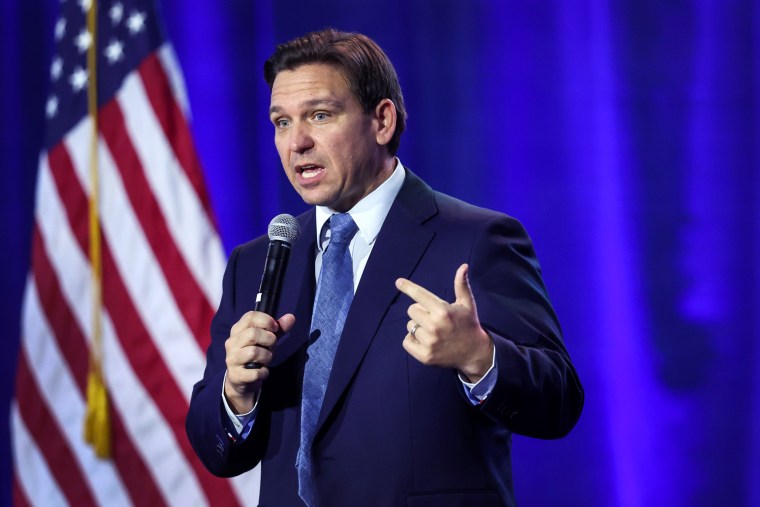Florida Gov. Ron DeSantis, who is all but certain to officially declare his 2024 White House ambitions any day now, has issued a statement on the war in Ukraine and entered the fray on the most hot-button foreign policy issue of the day. But it’s a weaselly statement. DeSantis sounds as if he is aligned with Trump on the war, but the language is also designed to make him look more opposed to President Joe Biden's policy than he is. DeSantis wants to look like a MAGA candidate, but he’s doing it in the squirmiest way possible.
DeSantis issued the statement to Fox News host Tucker Carlson in response to a questionnaire. That in and of itself is a clue as to how he likely wanted his statement to be received. Given that Carlson is a staunch nationalist and critic of aid to Ukraine, it only makes sense that DeSantis would offer a lengthy statement that Carlson would be congenial to.
It is still striking to see a more buttoned-up, establishment-friendly politician like DeSantis so blatantly downplay Russia’s misbehavior.
The statement ticks all the boxes on right-wing nationalist rhetoric: “While the U.S. has many vital national interests — securing our borders, addressing the crisis of readiness within our military, achieving energy security and independence, and checking the economic, cultural, and military power of the Chinese Communist Party — becoming further entangled in a territorial dispute between Ukraine and Russia is not one of them,” it reads.
There are a couple things to note here. First, in accordance with America First principles, DeSantis focuses on the U.S.’s border security and energy security, and highlights only China as a foreign adversary worthy of challenge. Second, he signals extraordinary friendliness to Moscow when he refers to the war in Ukraine as a “territorial dispute.” The language implies that Russia and Ukraine might have equally legitimate claims to land in the war, and obscures the reality that Russia invaded Ukraine in a war of aggression and is trying to annex Ukraine’s territory in violation of international law. That’s not entirely surprising given his ambitions, but it is still striking to see a more buttoned-up, establishment-friendly politician like DeSantis so blatantly downplay Russia’s misbehavior.
But there’s another dynamic in DeSantis’ statement that’s also important to track: DeSantis wants to sound like he’s planning on standing up to warmongers in the Biden administration, but does it largely by implying or explicitly arguing Biden is doing things that he isn’t. DeSantis objects to sending weapons to Ukraine that would be used offensively rather than defensively. He opposes sending Ukraine F-16 jets. He says that it is unacceptable to “risk explicitly drawing the United States into the conflict and drawing us closer to a hot war between the world’s two largest nuclear powers.” He decries pursuing a policy of “regime change” in Russia. And he rejects a “blank check” policy toward aiding Ukraine.
These are all sensible positions — and ones that Biden already holds, as the foreign policy writer Daniel Larison has pointed out. “Like Biden, [DeSantis] says he worries about escalation risks and the possibility of direct conflict between the U.S. and Russia, but he can’t be seen acknowledging that Biden holds these same views,” Larison writes. DeSantis resolves this predicament by using vague innuendo to imply that the status quo in the Biden administration is more hawkish than it is.
The fact that Biden isn’t actually doing the things that DeSantis warns against doesn’t mean it’s not worth saying. There are some extreme hawks in Washington — in both parties — who are less risk-averse than the Biden administration has been. This statement is at least a rejection of their views. And DeSantis is right on one count — the Biden administration has failed to clearly articulate “defined objectives” in the U.S.’s involvement in the war.
But the question remains: If DeSantis were to enter the White House, what exactly would he do that’s different from Biden? If he wants to decrease aid, how much would he want to decrease it by? If his main goal is “peace,” what would his main diplomatic goals and concessions be? In order to have a real policy debate, we’ll need more details.

